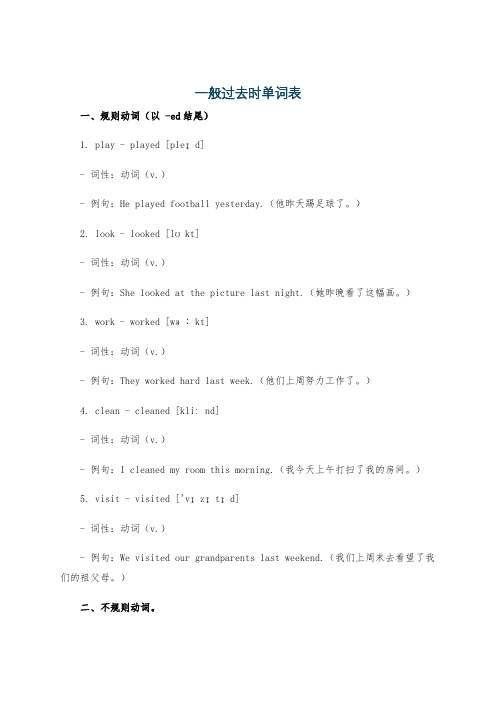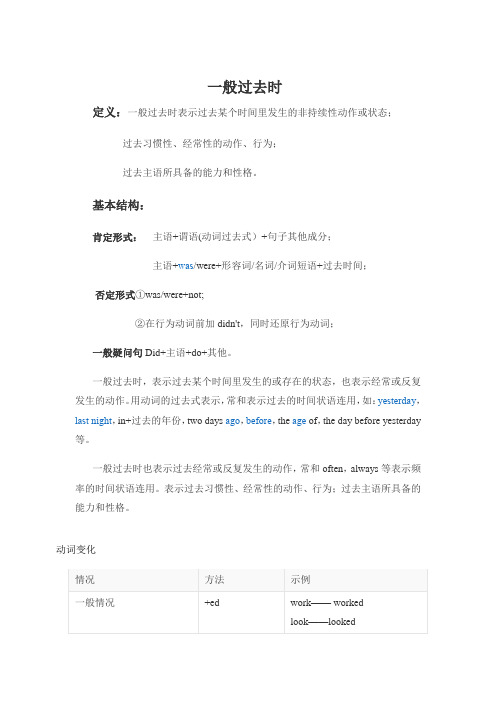一般过去时
- 格式:ppt
- 大小:2.31 MB
- 文档页数:45

一般过去时单词表一、规则动词(以 -ed结尾)1. play - played [pleɪd]- 词性:动词(v.)- 例句:He played football yesterday.(他昨天踢足球了。
)2. look - looked [lʊkt]- 词性:动词(v.)- 例句:She looked at the picture last night.(她昨晚看了这幅画。
)3. work - worked [wɜːkt]- 词性:动词(v.)- 例句:They worked hard last week.(他们上周努力工作了。
)4. clean - cleaned [kliːnd]- 词性:动词(v.)- 例句:I cleaned my room this morning.(我今天上午打扫了我的房间。
)5. visit - visited ['vɪzɪtɪd]- 词性:动词(v.)- 例句:We visited our grandparents last weekend.(我们上周末去看望了我们的祖父母。
)二、不规则动词。
1. go - went [went]- 词性:动词(v.)- 例句:He went to school by bike yesterday.(他昨天骑自行车去上学了。
)2. see - saw [sɔː]- 词性:动词(v.)- 例句:I saw a movie last night.(我昨晚看了一部电影。
)3. eat - ate [eɪt]- 词性:动词(v.)- 例句:She ate an apple this morning.(她今天上午吃了一个苹果。
)4. come - came [keɪm]- 词性:动词(v.)- 例句:They came to my house last Sunday.(他们上周日来到了我家。
)5. do - did [dɪd]- 词性:动词(v.)- 例句:What did you do yesterday?(你昨天做了什么?)6. have - had [hæd]- 词性:动词(v.)- 例句:He had a great time at the party last night.(他昨晚在聚会上玩得很开心。

一般过去时归纳与总结一般过去时是英语中常用的时态之一,用来描述过去发生的动作、状态或习惯。
在本文中,我们将对一般过去时的用法进行归纳与总结。
一、肯定句的构成一般过去时的肯定句由主语 + 动词的过去式构成。
例如:1. I studied English last night.2. She went to the park yesterday.3. They played football in the afternoon.二、否定句的构成一般过去时的否定句由主语 + did not (didn't) + 动词原形构成。
例如:1. I didn't study English last night.2. She didn't go to the park yesterday.3. They didn't play football in the afternoon.三、疑问句的构成一般过去时的疑问句由Did + 主语 + 动词原形构成。
例如:1. Did you study English last night?2. Did she go to the park yesterday?3. Did they play football in the afternoon?四、一般过去时的常用时间状语一般过去时常与以下时间状语连用,表示过去发生的动作或状态:1. yesterday:昨天2. last week/month/year:上周/上个月/去年3. in 1990:在1990年4. when I was a child:当我还是个孩子的时候5. at that time:那时候6. ago:以前例如:1. He visited his grandparents last week.2. We went to the beach yesterday.3. They lived in London in 1990.4. When I was a child, I played football every day.5. She bought a new car ten years ago.五、一般过去时的特殊用法1. 表示过去的习惯或经常性动作,常与副词often, usually, always连用。

一般过去时用法一般过去时是英语语法中的一个重要时态,用来描述发生在过去的动作或状态。
在英语中,一般过去时的构成和用法有一些规则和特点,需要我们在学习和使用时加以重视。
本文将详细解释一般过去时的构成、用法和一些常见的注意事项,旨在帮助读者更深入地掌握一般过去时的用法。
一、一般过去时的构成一般过去时的构成主要涉及动词的变化形式。
在英语中,一般过去时的动词通常是通过在动词原形后加上-ed或-d来构成的。
但也有一些不规则动词需要特殊记忆它们的过去式形式。
1. 规则动词的过去式构成对于大多数动词,它们的一般过去时形式是在动词原形后面加上-ed。
例如:- talk → talked- walk → walked- play → played对于以不发音的-e结尾的动词,只需加-d即可构成过去式。
例如:- dance → danced- admire → admired- escape → escaped2. 不规则动词的过去式构成也有一些动词的过去式是不规则的,需要记住它们的过去式形式。
例如:- go → went- be → was/were- eat → ate- see → saw- do → did以上是一般过去时构成的基本规则,掌握这些构成规则对于正确使用一般过去时非常重要。
下面我们将介绍一般过去时的用法。
二、一般过去时的用法一般过去时用来表示过去某个时刻或一段时间内的动作或状态。
在语法上,一般过去时还可以用于肯定句、否定句和疑问句中,其用法如下:1. 肯定句在肯定句中,一般过去时的动词形式是直接加上过去式。
例如:- I studied English last night.- She visited her grandparents yesterday.- We watched a movie on Friday.2. 否定句在否定句中,一般过去时的动词需要使用助动词did+ not构成,主语可以直接跟在助动词后,动词本身用原形。

一般过去时的语法一般过去时是英语中用来描述过去发生的动作或状态的一种时态。
在一般过去时中,动词的形式通常会发生变化,以表示过去的时间。
本文将从不同角度详细介绍一般过去时的语法规则和用法。
一、一般过去时的基本构成一般过去时的肯定句由主语+动词的过去式构成,例如:- He played basketball yesterday.(他昨天打篮球。
)- They watched a movie last night.(他们昨晚看了一部电影。
)二、一般过去时的否定句一般过去时的否定句的构成是在动词前加上助动词did not或didn't,例如:- He did not play basketball yesterday.(他昨天没有打篮球。
)- They didn't watch a movie last night.(他们昨晚没有看电影。
)三、一般过去时的疑问句一般过去时的疑问句的构成是将助动词did提到句首,例如:- Did he play basketball yesterday?(他昨天打篮球了吗?)- Did they watch a movie last night?(他们昨晚看电影了吗?)四、一般过去时与时间状语的搭配一般过去时常常与表示过去的时间状语连用,以明确动作发生的时间。
常见的时间状语有:yesterday(昨天)、last night(昨晚)、last week(上周)、in 2010(在2010年)等等。
五、一般过去时的用法1. 表示过去发生的动作或状态She lived in New York for five years.(她在纽约住了五年。
)2. 表示过去经常或反复发生的动作He often went swimming when he was young.(他年轻时经常去游泳。
)3. 表示过去的习惯或常态She always cooked dinner for her family.(她过去总是为家人做晚饭。

一般过去时定义:一般过去时表示过去某个时间里发生的非持续性动作或状态;过去习惯性、经常性的动作、行为;过去主语所具备的能力和性格。
基本结构:肯定形式:主语+谓语(动词过去式)+句子其他成分;主语+was/were+形容词/名词/介词短语+过去时间;否定形式①was/were+not;②在行为动词前加didn't,同时还原行为动词;一般疑问句Did+主语+do+其他。
一般过去时,表示过去某个时间里发生的或存在的状态,也表示经常或反复发生的动作。
用动词的过去式表示,常和表示过去的时间状语连用,如:yesterday,last night,in+过去的年份,two days ago,before,the age of,the day before yesterday 等。
一般过去时也表示过去经常或反复发生的动作,常和often,always等表示频率的时间状语连用。
表示过去习惯性、经常性的动作、行为;过去主语所具备的能力和性格。
动词变化句法结构编辑肯定形式主语+动词过去式+其他例句:She often came to help us in those days.否定形式主语+didn't +谓语动词原型+其他①was/were+not;②在行为动词前加didn't,同时还原行为动词例句:I didn't know you like coffee.一般疑问句①Did+主语+谓语动词原型+其他?②Was/Were+主语+表语?例句:Did I do homework?用表格整理如下:记法口诀一般过去时并不难,过去动作、状态记心间。
动词要用过去式,时间状语句末站。
否定句很简单,didn't 站在动原前,其它部分不要变。
一般疑问句也好变,did放在句子前,主语、动原、其它部分依次站立。
特殊疑问句也简单,疑问词加一般疑问句记心间。
用法(1)一般过去时表示在过去某个特定时间发生,也可以表示过去习惯性、经常性的动作。

三.一般过去时(simple past tense)1.概念一般过去时表示过去某一时刻,某一段时间发生的动作或存在的状态。
一般过去时用动词的过去式表示。
2.构成一般过去时用动词的过去式表示。
be的过去式有was,were两种; have 的过去式是had;规则动词的过去式在动词词尾加-ed,具体构成规则如下:1)一般情况,动词后加ed,例词work-worked,clean-cleaned,play-played,wash-washed2)以不发音的e结尾,-d,例词live-lived,move-moved,hope-hoped,arrive-arrived 3)以辅音字母+y结尾,变y为 i再加-ed,例词study-studied,carry-carried,cry-cried,identify-identified 4)以辅音字母结尾的重读闭音节,双写最后一个辅音字母加-ed,例词plan-plannedstop-stopped,beg-begged,grab-grabbed 3.用法 (1) 表示发生在过去的动作或存在的状态。
如:He went shopping with his friends last week.They arrived ten minutes ago.He became a hotel manager ten years ago.Did you go to the concert last night?(2) 表示在过去经常发生的动作或习惯动作。
如:He visited his grandparents once a month last year.She usually went to work by car last year.When I was at school, I always went to school by bus.4.如何识别一般过去时常见的标志词有:1). yesterday, the day before yesterday.2). last week / year / month / term …(简称last系列)3). two hours ago, three years ago, a moment ago…(简称ago系列)4). in / on + 过去的年/月/日,如 in 1999, on April, 20055). just now, once upon a time, one day…5.易错点例析:(1)——Your phone number again? I _________ quite catch it.——It’s 4331577A. didn’tB. couldn’tC. don’tD. can’t(2)——Mr. Smith isn’t coming tonight.——But he _________.A. promisesB. promisedC. will promiseD. had promised(3) ——Hey, look where you are going!——Oh, I’m terribly sorry. _________.A. I’m not noticingB. I wasn’t noticingC. I haven’t noticedD. I don’t notice(4) ——Oh it’s you ! I _________ you.——I’ve had my hai r cut.A. didn’t realizeB. haven’t realizedC. didn’t recognizeD. don’t recognized(5) ——Since you’ve agreed to go, why aren’t you getting ready?——But I _________ that you would have me start at once.A. don’t realizeB. didn’t realizeC. hadn’t realizedD. haven’t realized(6) ——It’s twelve o’clock, I think I must be off now.——Oh, really? I _________ it at all.A. don’t realizeB. haven’t realizedC. didn’t realizeD. hadn’t realizedKey:ABBCBC6.中考真题及模拟(2009朝阳区一模)He went into his room, _______ the light and began to work.A. has turned onB. will turn onC. turns onD. turned on(2009海淀一模)——What’s the best food have you had in Beijing, Alex?——Roast duck! I _________to a famous restaurant to have it last week.A. have goneB. goC. will goD. went(2009宣武区一模)——Do you know how many gold medals the 23-year-old Michael Phelps _____________at the 2008 Summer Olympic Games?——Eight.A. winB. winsC. wonD. has won(2008北京)We were in Qingdao last week and __________ great fun there.A. will haveB. have hadC. hadD. have(2007北京)——What did you do after school yesterday?——I _________basketball with my friends.A. playB. playedC. will playD. am playing(2005北京)---Hi, Kate. You look tired. What’s the matter?---I ______well last night.A. didn’t sleepB. don’t sleepC. haven’t sleptD. won’t sleep (2008四川泸州)Yesterday,Tony’s family _________ a good time.A. hasB. haveC. had(2007湖南湘潭)I’m sorry you’ve missed the train. It _______10 minutes ago.A. leftB. has leftC. had left(2007福州)——Mr Green, __________you________ Three Lanes and Alleys(三坊七巷)last Sunday?——No, but I’ll visit them next week.A. will; go toB. have; been toC. did; go toD. have; gone to (2007浙江)——What did the teacher say just now?——He __________us not to play computer games all day.A. tellsB. toldC. has toldD. is told(2007江西)——Inventors have changed the way we live.——So they are famous for the great things they _________.A. doB. didC. are doingD. had done(06江西)——Where’s the cake I made this morning?——We _______ it, mum. Can you make another one for us?A. ateB. eatC. will itD. were eating。
一般过去时的概念及用法一、基本概念一般过去时(simple past tense)表示过去某个时间里发生的非持续性动作或存在的状态,也表示经常或反复发生的动作。
用动词的过去式表示,常和表示过去的时间状语连用,如:yesterday,last night,in 1990,two days ago,before,the age of等。
一般过去时也表示过去经常或反复发生的动作,常和often,always等表示频率的时间状语连用。
表示过去习惯性、经常性的动作、行为;过去主语所具备的能力和性格。
二、动词变化1.直接加ed: work—- worked look——looked2.以不发音e结尾的单词,直接加d: live ——lived hope-—hoped use——used3.以辅音字母+y结尾的,变y为i加ed: study——studied carry—-carried worry--worried 4.以一个辅音字母结尾的,双写最后的辅音字母+ed: stop—— stopped plan-—planned重读闭音节体现形式为辅-元-辅结构,例如nod, n为辅音,o为元音,d为辅音。
5。
以ic结尾的动词,要把ic变成ick再加ed,如picnic→picnicked,traffic→traffic ked 6.不规则变化的动词过去式:have---had are-—-were get-—-got say--—said feel——-felt do/does———did is---was go—--went drink——drank eat—-ate bring-———brought think-—--thought buy----bought catch--—- caught teach ---—taught sit-———sat wear—--—wore cut———-cut sweep----swept sleep-—slept see--——saw become-—-—became read-—read7.以辅元辅结尾的加d三、用法(1)一般过去时表示在过去某个特定时间发生,也可以表示过去习惯性、经常性的动作.一般不强调动作的影响,只说明的事情。
一般过去时定义,结构,标志词,用法一般过去时是英语中最基本的过去时态之一,它用于描述过去发生的动作或状态。
本文将介绍一般过去时的定义、结构、标志词和用法。
一、定义一般过去时是指发生在过去的动作或状态,不考虑其持续时间或是否已经完成。
它用于描述已经结束的事情,通常与表示过去的时间短语一起使用。
二、结构一般过去时的结构很简单,主要由动词的过去式构成。
对于大多数动词,过去式是在动词原形后加上-ed,如walked,talked,played 等。
但是,有一些动词的过去式是不规则的,需要记忆,如go的过去式是went,eat的过去式是ate等。
另外,一般过去时的肯定句结构为:主语 + 动词过去式 + 其他。
如:I walked to the park yesterday.(我昨天走到了公园。
)否定句的结构为:主语 + did not + 动词原形 + 其他。
如:I did not walk to the park yesterday.(我昨天没有走到公园。
)疑问句的结构为:Did + 主语 + 动词原形 + 其他?如:Did you walk to the park yesterday?(你昨天走到了公园吗?)三、标志词一般过去时的标志词有很多,其中最常见的有以下几种:1. 表示过去的时间短语,如yesterday(昨天)、last week(上个星期)、in 1999(在1999年)等。
2. 过去式的动词,如walked(走)、talked(谈话)、played(玩)等。
3. 过去式的助动词did,如did not(没做)、did you(你做了吗?)等。
四、用法一般过去时通常用于以下情况:1. 描述过去的事件或状态,如:I went to the park yesterday.(我昨天去了公园。
)2. 描述过去的习惯或经常性动作,如:When I was a child, I played with dolls every day.(我小时候每天都和玩偶玩。
一般过去时一、一般过去时的定义一般过去时表示过去某一时候或某一段时间所发生了的事情或存在的状态。
二、标志语:yesterday(昨天), this morning(今天早上), just now(刚刚), a moment ago(片刻之前), last night (昨晚) last year (去年)last week(上周), at that time(在那个时候), the day before yesterday(前天), before(在...之前)in+过去年份(in 2018),what happened?(发生什么事了?)三、Be动词一般过去时:⑴am 和is在一般过去时中变为was。
(was not=wasn’t)⑵are在一般过去时中变为were。
(were not=weren’t)(肯定句)I was a student ten years ago.主语+was/were+其他.(否定句)I was not a student ten years ago.主语+wasn’t/weren’t+其他.(一般疑问句)Were you a student ten years ago?Yes,I was/No,I wasn’t.Was/were+主语+其他?Yes,主代+was/were.No,主代+wasn’t/weren’t.注意:带有was或were的句子,其否定、疑问的变化和is, am, ar e一样,即否定句在was或were后加not,一般疑问句把was或wer e放到句首,第一人称变第二人称。
(特殊疑问句)1.对I提问:Who was a student ten years ago?(Who作为主语时,谓语动词用三单)四、实义动词一般过去时:(肯定句)I walked to school yesterday.主语+动词过去式+其他.(否定句)I didn’t walk to school yesterday.主语+didn’t + 动词原形+其他.否定句变化规则:1、找be动词2、若无be动词,找情态动词(could)3、若无情态动词,请助动词(did)来帮助4、did放于主语的后面,动词的前面,加上not,did not= didn't5、动词变原形6、some->any and->or too->either(一般疑问句)Did you walk to school yesterday?Yes,I did. No,I didn’t.Did +主语+动词原形+其他?Yes,主代+did.No,主代+didn’t.一般疑问句变化规则:1、找be动词2、若无be动词,找情态动词(could)3、若无情态动词,请助动词(did)来帮助4、did放于开头,首字母大写5、第一人称变第二人称6、动词变原形7、some->any and->or too不变either(特殊疑问句)I went to school on foot yesterday.1.对I 提问:Who went to school on foot yesterday?2.对went to school 提问:What did you do on foot yesterday?3.对school 提问:Where did you go on foot yesterday?4.对on foot 提问:How did you go to school yesterday?5.对yesterday提问:When did you go to school on foot?动词变化规则:1、直接在动词后面加ed。
英语语法一般过去时的用法一般过去时表示过去某个时间里发生的动作或状态;过去习惯性、经常性的动作、行为。
在英语语法中,“时“指动作发生的时间,”态“指动作的样子和状态。
下面是小编为您收集整理的英语语法一般过去时的用法,供大家参考!英语语法一般过去时的用法一般过去时1.一般过去时表示过去某个时间发生的动作或存在的状态,常和表示过去的时间状语连用。
一般过去时也表示过去经常或反复发生的动作感谢。
2.Be动词在一般过去时中的变化:⑴am和is在一般过去时中变为was(was not=wasn’t)⑵are在一般过去时中变为were(were not=weren’t)⑶带有was或were的句子,其否定、疑问的变化和is, am, are 一样,即否定句在was或were后加not,一般疑问句把was或were 调到句首。
3.句中没有be动词的一般过去时的句子否定句:didn’t +动词原形,如:Jim didn’t go home yesterday.一般疑问句:在句首加did,句子中的动词过去式变回原形。
如:Did Jim go home yesterday?特殊疑问句:⑴疑问词+did+主语+动词原形?如:What did Jim do yesterday?⑵疑问词当主语时:疑问词+动词过去式?如:Who went to home yesterday?动词过去式变化规则:1.一般在动词末尾加-ed,如:pull-pulled, cook-cooked2.结尾是e加d,如:taste-tasted3.末尾只有一个元音字母和一个辅音字母的重读闭音节,应双写末尾的辅音字母,再加-ed,如:stop-stopped4.以“辅音字母+y”结尾的,变y为i,再加-ed,如:study-studied5.不规则动词过去式:am,is-was, are-were, do-did, see-saw, say-said, give-gave, get-got, go-went, come-came, have-had, eat-ate, take-took, run-ran, sing-sang, put-put, make-made, read-read, write-wrote, draw-drew, drink-drank, fly-flew, ride-rode, speak-spoke, sweep-swept, swim-swam, sit-sat过去时练习写出下列动词的过去式is\am_______ fly_______ plant_______ are_______drink_______ play_______ go_______ make_______does_______ dance_______ worry________ ask_______taste_______ eat_______ draw________ put_______throw_______ kick_______ pass_______ do_______语法讲解一般过去时也叫单纯过去时。